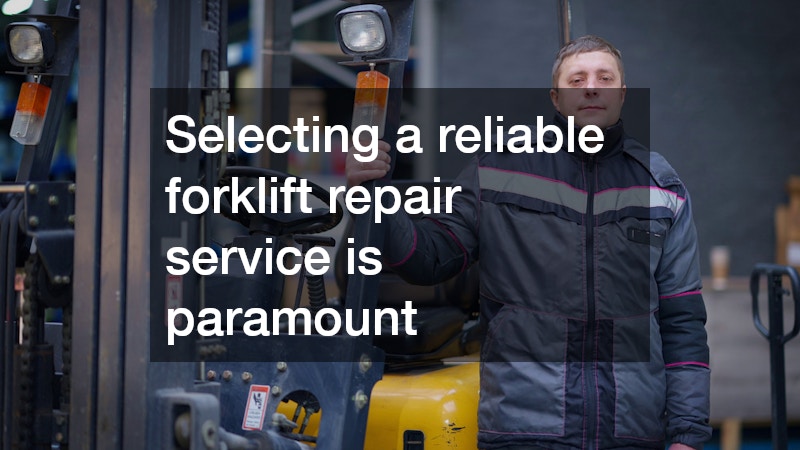Having a reliable and well-maintained forklift is essential for any business that relies on material handling. When your forklift requires repairs, knowing the right questions to ask can ensure you’re getting the best service and prolonging the life of your equipment. Explore the common concerns and topics to consider regarding forklift repairs.
What are the Signs That My Forklift Needs Repairs?
In the hectic operations of material handling, it is crucial to be vigilant about the health of your forklifts. Unusual noises are often the first sign that something might be off-kilter.
These can include squeaks, clunks, or grinding sounds, often indicating something internal is in need of attention. Catching these issues early can prevent further damage and costlier repairs down the road.
A noticeable drop in performance can also serve as a warning sign. This can manifest in reduced lifting capacity, slower acceleration, or even erratic handling. Such issues are not only efficiency-breakers but can also pose safety risks to operators and surrounding workers. Regularly tracking your equipment’s performance metrics could provide early indicators of required maintenance.
Visible damages, such as cracks, leaks, or worn-out parts, should be taken seriously. Physical inspections often reveal the more apparent issues that need addressing. Furthermore, these checks can help you spot wear and tear on crucial components such as chains, forks, and tires that might not be as evident immediately but need attention to prolong the equipment’s usability.
How Do I Choose a Reliable Forklift Repair Service?
Selecting a reliable forklift repair service is paramount to ensure the longevity and efficiency of your machinery. A good starting point is to assess the experience level of the service provider. Companies that have been in business for several years often have the expertise to handle a wide range of issues effectively, ensuring high-quality repairs.
Certifications can also serve as a useful gauge of a service provider’s reliability. Certified technicians are likely to have received training that enables them to perform repairs in accordance with industry standards. In turn, this suggests a higher likelihood of receiving comprehensive and competent repair services.
Customer reviews, both online and word-of-mouth, offer insights into the service standards of a repair provider. These reviews provide firsthand accounts of other clients’ experiences, which can be invaluable when determining if a service provider will meet your specific needs. Specialized knowledge in certain forklift models or brands can also be a deciding factor.
How Can I Prevent Frequent Forklift Repairs?
Preventive maintenance is your first line of defense against frequent repairs and unexpected breakdowns. Regular inspections and servicing, ideally on a schedule set in collaboration with your repair provider, can catch issues before they escalate into costly repairs, ensuring smoother operations.
Investing in comprehensive training for forklift operators can substantially reduce wear and tear on the machinery. Proper handling practices minimize the stress exerted on the equipment, reducing the likelihood of damage and the subsequent need for repairs. Ensuring operators are well-versed in equipment controls and safety protocols is a critical step in this process.
Implementing a maintenance log can help you track services and repairs, providing valuable information for future maintenance planning. This log should detail every inspection, issue, and repair, aiding in the identification of recurring problems or patterns that might require additional attention.
What Should I Consider Regarding Forklift Repair Parts?
The choice between OEM and aftermarket parts is a significant consideration when addressing forklift repairs. OEM parts are engineered specifically for your equipment, ensuring compatibility and performance. However, they tend to be more expensive, which can impact your repair budget.
Aftermarket parts, on the other hand, are often more affordable and can provide adequate performance if selected with care. It is essential, however, to validate their quality and compatibility thoroughly. Opt for reputable brands known for producing reliable parts that meet industry standards.
Parts availability and delivery times may also impact your choice. Quick access to parts can significantly influence downtime, affecting your overall productivity. Establishing a relationship with suppliers who can offer timely deliveries may prove beneficial in reducing hang-ups in the repair process.
By asking the right questions about your forklift repairs, you can ensure that you receive quality service and extend the lifespan of your equipment. With the insights provided in this article, you can make informed decisions about when and how to repair your forklifts effectively. Being proactive and knowledgeable in this regard safeguards your investment and promotes sustained business operations.

